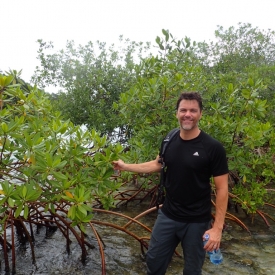Principal Investigator
Publications
-
(2010). Land use history alters the relationship between native and exotic plants: the rich don't always get richer . Biological Invasions, 12 (6) , 1557-1571. http://dx.doi.org/10.1007/s10530-009-9568-3
-
(2010). Herbivory enhances positive effects of plant genotypic diversity . Ecology Letters, 13 (5) , 553-563. http://dx.doi.org/10.1111/j.1461-0248.2010.01452.x
-
(2008). A Specialist detritivore links Spartina alterniflora to salt marsh food webs . Marine Ecology Progress Series, 364 , 87-95.
-
(2007). Stream mosses as chemically-defended refugia for freshwater macroinvertebrates . Oikos, 116 (2) , 302-312. http://dx.doi.org/10.1111/j.0030-1299.2007.15289.x
-
(2006). Chemically-mediated competition between microbes and animals: microbes as consumers in food webs . Ecology, 87 , 2821-2831.
-
(2006). Opposing effects of native and exotic herbivores on plant invasions . Science, 311 , 1459-1461.
-
(2006). Response to Comment on “Opposing effects of native and exotic herbivores on plant invasions” . Science, 313 (5785) , 298. http://dx.doi.org/10.1126/science.1129065
-
(2006). Chemical defense promotes persistence of the aquatic plant Micranthemum umbrosum . Journal of Chemical Ecology, 32 , 815-833.
-
(2005). Biotic resistance to plant invasions? Native herbivores prefer non-native plants . Ecology Letters, 8 , 959-967.
-
(2004). Mutualisms and aquatic community structure: the enemy of my enemy is my friend . Annual Review of Ecology, Evolution, and Systematics, 35 , 175-197.
-
(2001). Grazer diversity, functional redundancy, and productivity in seagrass beds: an experimental test . Ecology, 82 (9) , 2417-2434.
-
(2001). Plant species diversity and composition: experimental effects on marine epifaunal assemblages . Marine Ecology Progress Series, 224 , 55-67.
Pages
- « first
- ‹ previous
- 1
- 2
- 3
- 4


